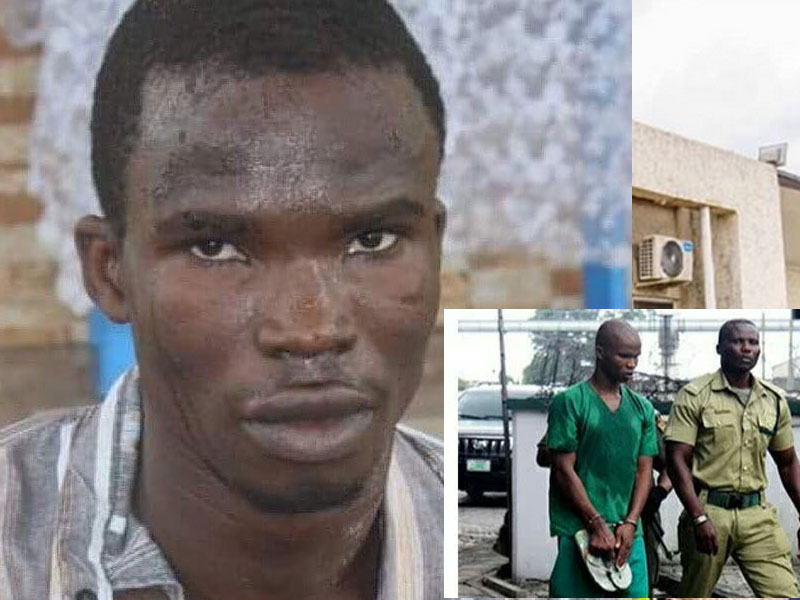A gruesome murder; a gruesome verdict.
Warning: the article below contains graphic details which may shock the reader (webmaster FVDK).
Rivers Ritual Killing: University Undergraduate, Accomplice to Die by Hanging

Published: May 14, 2020
By: This Day (Nigeria)
Justice Adolphus Enebeli of the Rivers State High Court sitting in Port Harcourt, has sentenced one Ifeanyi Maxwell Dike to death by hanging for the killing of an eight-year-old Victory Chikamso, a female for ritual purposes in 2017.
Also sentenced to death alongside Dike is one Ugochukwu Nwamairo, his accomplice who reportedly requested for the supply of the human body parts for money ritual.
Also, an ex-police sergeant who allegedly aided Dike’s escape from prison at night after his detention, Johnbosco Okoronze got one year imprisonment, for aiding and abating escape of the murderer.
Dike, a 200-level Physics student of the University of Port Harcourt, (UNIPORT), on August 18, 2017 allegedly strangled his victim who was also his niece and primary two pupil of a private school in Port Harcourt.
Dike perpetrated the act in his (Dike’s) room at Eliozu community, in Obio/Akpor Local Government of the state, where he also removed the vital parts of her body.
Chikamso’s body parts such as, breast, private part, fingers, ear, heart, eyelid, among others, were discovered missing when the remains were found with Dike.
He was on his way to the community central crash bin at midnight to dispose of what was left of the body of the child when he was apprehended by men of the community vigilante and was handed over to the police.
The duo, Dike and Nwamiro were found guilty of the two-count charge of conspiracy and murder levelled against them.
Sentencing them, Justice Enebeli pronounced that Dike should be hanged on his neck until he dies, while Nwamiro should be hanged on his leg until he dies (upside down).
The court explained that it decided to sentence the ex-police sergeant to just one year jail term because he has already served two years in prison from the time he was arrested, adding also that he has been dismissed from police force, since the case began.
He noted that Nwamairo’s conviction and sentence was based on Dike’s evidence-in-chief and voluntary confession/ statement on four different occasions that, the second defendant (Nwamairo), had requested the body parts of a little girl, including the heart for financial independence.
The court ruled that the prosecution proved his case beyond reasonable doubts, insisting that counsel to Dike, Lezina Amegwa “in his written address did not deny the fact that his client committed the murder but said he was not in his right frame of mind when he committed the act, meaning that he was mentally deranged and insane.”
The court verdict caused panic and serious outburst among Nwamairo’s family members who were present when the judgment was delivered.
His wife collapsed and was carried away by other members of the family present while one of the brothers, was noticed shouting on top of his voice, insisting that the brother was innocent of the crime, adding that the judgment was wrong and would be appealed as they cried profusely.
Speaking to journalists shortly, the prosecution counsel, Mr. Chidi Eke, described the judgment as landmark, adding that “it has brought about justice for the state, the family of late Victory Chikamso and the soul of the departed.”
However, counsel to Nwamiro, Mr. John Ndah expressed displeasure over the judgment and assured that it would be appealed.
As for Dike and his lawyer, Amegwa, it is all over with the case.
“We may not appeal the matter because of the circumstances in the judgment,” they concluded.
Source: Rivers Ritual Killing: University Undergraduate, Accomplice to Die by Hanging

It would be recalled that Dike escaped from police custody, using the darkness of the night to run away from the cell of the State criminal investigation Department, the night he was arrested and was re-arrested in Jos, Plateau state, two weeks after.
Source:
Undergraduate, accomplice to die by hanging in Rivers (The Nation, May 13, 2020)

